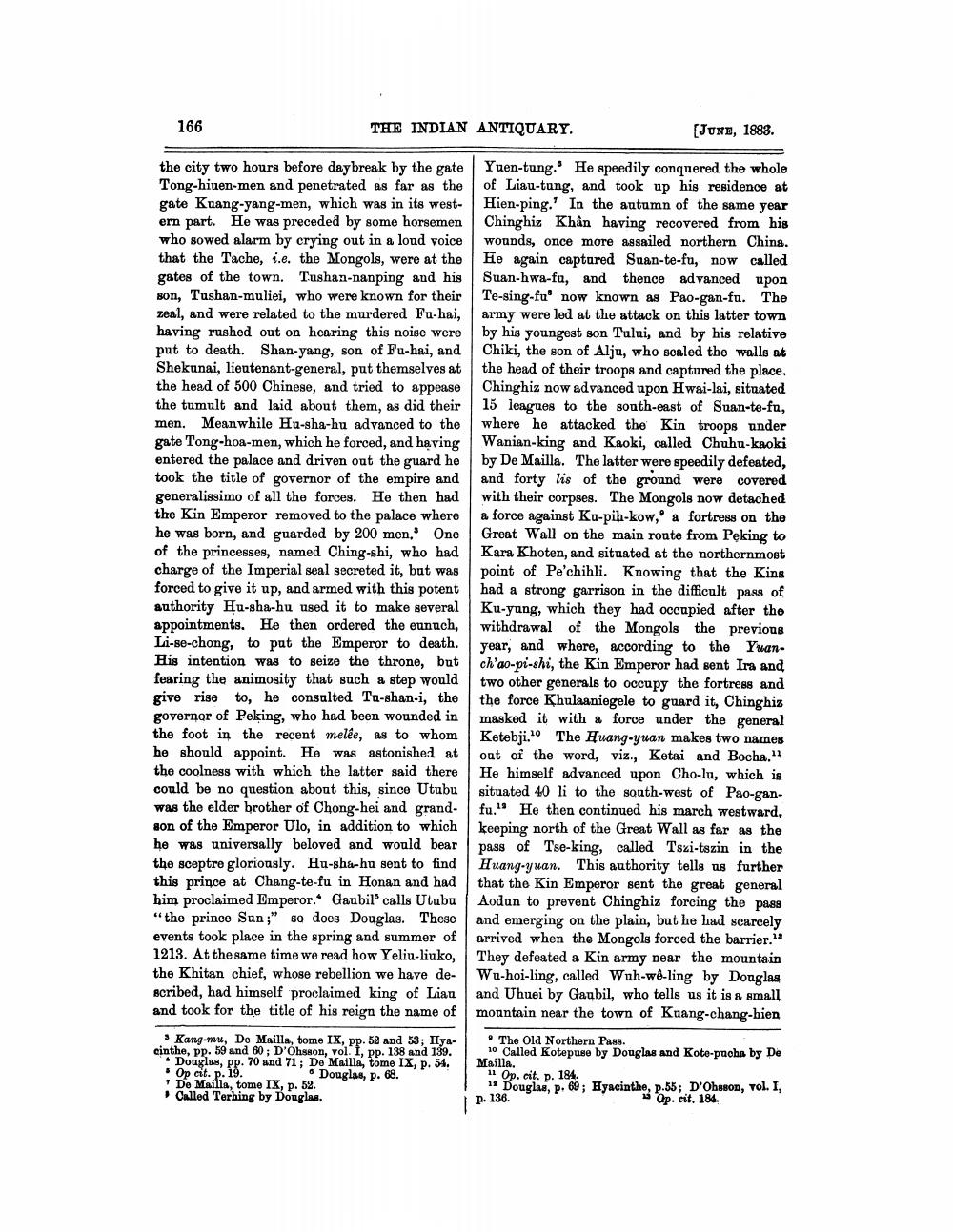________________
166
THE INDIAN ANTIQUARY.
(JUNE, 1883.
the city two hours before daybreak by the gate Tong-hiuen-men and penetrated as far as the gate Kuang-yang-men, which was in its western part. He was preceded by some horsemen who sowed alarm by crying out in a loud voice that the Tache, i.e. the Mongols, were at the gates of the town. Tushan-nanping and his son, Tushan-muliei, who were known for their zeal, and were related to the murdered Fu-hai, having rushed out on hearing this noise were put to death. Shan-yang, son of Fu-hai, and Shekunai, lieutenant-general, put themselves at the head of 500 Chinese, and tried to appease the tumult and laid about them, as did their men. Meanwhile Hu-sha-hu advanced to the gate Tong-hoa-men, which he forced, and having entered the palace and driven out the guard ho took the title of governor of the empire and generalissimo of all the forces. He then had the Kin Emperor removed to the palace where he was born, and guarded by 200 men. One of the princesses, named Ching-shi, who had charge of the Imperial seal secreted it, but was forced to give it up, and armed with this potent authority Hu-sha-hu used it to make several appointments. He then ordered the eunuch, Li-se-chong, to put the Emperor to death. His intention was to seize the throne, but fearing the animosity that such a step would give rise to, he consulted Tu-shan-i, the governor of Peking, who had been wounded in the foot in the recent melee, as to whom he should appoint. He was astonished at the coolness with which the latter said there could be no question about this, since Utubu was the elder brother of Chong-hei and grandson of the Emperor Ulo, in addition to which he was universally beloved and would bear the sceptre gloriously. Hu-sha-hu sent to find this prince at Chang-te-fu in Honan and had him proclaimed Emperor. Gaubil' calls Utubu "the prince San;" so does Douglas. These events took place in the spring and summer of 1213. At the same time we read how Yeliu-liuko, the Khitan chief, whose rebellion we have described, had himself proclaimed king of Liau and took for the title of his reign the name of
Yuen-tung. He speedily conquered the whole of Liau-tung, and took up his residence at Hien-ping. In the autumn of the same year Chinghiz Khân having recovered from his wounds, once more assailed northern China. He again captured Suan-te-fu, now called Suan-hwa-fu, and thence advanced upon Te-sing-fu' now known as Pao-gan-fu. The army were led at the attack on this latter town by his youngest son Tului, and by his relative Chiki, the son of Alju, who scaled the walls at the head of their troops and captured the place, Chinghiz now advanced upon Hwai-lai, situated 15 leagues to the south-east of Suan-te-fu, where he attacked the Kin troops under Wanian-king and Kaoki, called Chuhu-kaoki by De Mailla. The latter were speedily defeated, and forty lis of the ground were covered with their corpses. The Mongols now detached a force against Ko-pih-kow, a fortress on the Great Wall on the main route from Peking to Kara Khoten, and situated at the northernmost point of Pe'chihli. Knowing that the King had a strong garrison in the difficult pass of Ku-yung, which they had occupied after the withdrawal of the Mongols the previous year, and where, according to the Yuanch'ao-pi-shi, the Kin Emperor had sent Ira and two other generals to occupy the fortress and the force Khulaaniegele to guard it, Chinghiz masked it with a force under the general Ketebji. The Huang-yuan makes two names out of the word, viz., Ketai and Bocha." He himself advanced upon Cho-lu, which is situated 40 li to the south-west of Pao-ganfu." He then continued his march westward, keeping north of the Great Wall as far as the pass of Tse-king, called Tszi-tszin in the Huang-yuan. This authority tells us further that the Kin Emperor sent the great general Aodun to prevent Chinghiz forcing the pass and emerging on the plain, but he had scarcely arrived when the Mongols forced the barrier. They defeated a Kin army near the mountain Wu-hoi-ling, called Wuh-wê-ling by Douglas and Uhuei by Gaubil, who tells us it is a small mountain near the town of Kuang-chang-hien
• The Old Northern Pass. 10 Called Kotepuse by Douglas and Kote-pacha by De Mailla.
11 Op. cit. p. 184.
11 Douglas, p. 60; Hyacinthe, p.55; D'Ohsson, vol. I, p. 136.
1 Op. cit. 184.
Kang-mu, De Mailla, tome IX, pp. 52 and 53; Hyacinthe, pp. 59 and 60 ; D'Ohsaon, vol. 1, pp. 138 and 139. • Douglas, pp. 70 and 71; De Mailla, tome IX, p. 54. Op cit. p. 19.
Douglas, p. 68. De Mailla, tome IX, p. 52. Called Terbing by Douglas.




